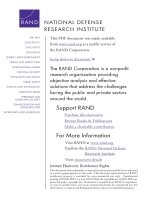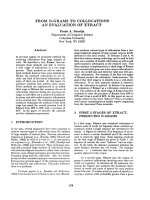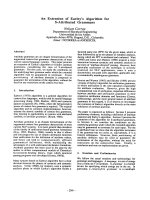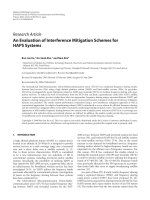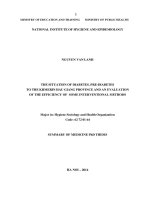from marx to lenin an evaluation of marx's responsibility for soviet authoritarianism
Bạn đang xem bản rút gọn của tài liệu. Xem và tải ngay bản đầy đủ của tài liệu tại đây (11.29 MB, 263 trang )
FROM MARX TO LENIN
/>Cambridge Books Online © Cambridge University Press, 2012
/>Cambridge Books Online © Cambridge University Press, 2012
FROM MARX
TO LENIN
An evaluation of
Marx's responsibility for
Soviet
authoritarianism
DAVID W. LOVELL
History of Ideas Unit
Institute of Advanced Studies
The Australian National University
The right of
the
University of Cambridge
to print and sell
all
manner
of books
was granted by
Henry VIII in 1534.
The University
(fas
printed
and published
continuously
since 1584.
CAMBRIDGE UNIVERSITY PRESS
Cambridge
London New York New Rochelle
Melbourne Sydney
/>Cambridge Books Online © Cambridge University Press, 2012
CAMBRIDGE UNIVERSITY PRESS
Cambridge, New York, Melbourne, Madrid, Cape Town, Singapore,
Sao Paulo, Delhi, Dubai, Tokyo
Cambridge University Press
The Edinburgh Building, Cambridge CB2 8RU, UK
Published in the United States of America by Cambridge University Press, New York
www. Cambridge. org
Information on this title: www.cambridge.org/9780521125536
© Cambridge University Press 1984
This publication is in copyright. Subject to statutory exception
and to the provisions of relevant collective licensing agreements,
no reproduction of
any
part may take place without the written
permission of Cambridge University Press.
First published 1984
Reprinted 1986
This digitally printed version 2009
A
catalogue
record for
this publication
is available from
the British Library
Library of
Congress Catalogue Card
Number:
83-26276
ISBN 978-0-521-26188-3 Hardback
ISBN 978-0-521-12553-6 Paperback
Cambridge University Press has no responsibility for the persistence or
accuracy of
URLs
for external or third-party internet websites referred to in
this publication, and does not guarantee that any content on such websites is,
or will remain, accurate or appropriate.
/>Cambridge Books Online © Cambridge University Press, 2012
for
Sue
/>Cambridge Books Online © Cambridge University Press, 2012
/>Cambridge Books Online © Cambridge University Press, 2012
CONTENTS
Preface page ix
1 Introduction i
2 Marx and the transition to socialism 24
3 Engels, democracy and revolution 71
4 Marxism and Revisionism 90
5 The Russian revolutionary tradition 119
6 Lenin and the Party 142
7 Lenin and the dictatorship 163
8 Conclusion 188
Notes 198
Select Bibliography 230
Index 235
vn
/>Cambridge Books Online © Cambridge University Press, 2012
/>Cambridge Books Online © Cambridge University Press, 2012
Cambridge Books Online © Cambridge University Press, 2012
PREFACE
Hegel has been denounced as the progenitor of modern totalitarian-
ism,
particularly Nazism, even though the National Socialists were
not really guided by his thought. Karl Marx has been considered as a
philosopher of freedom, even though his teachings are embraced by
states whose commitment to personal freedoms is merely formal. I
do not wish to labour the ironies of history, however, but to
introduce the general issue of which this study treats a particular
instance. That issue is the relationship between political and social
theorists and the states and policies inspired by or attributed to
them. What, in other words, constitutes historical continuity and
legitimate application of political and social projects? This book
examines whether Soviet authoritarianism was a necessary or
inevitable consequence of Lenin's attempt to fulfil what he under-
stood as Marx's project by tracing the concept of the transition to
socialism through the Marxist tradition, from Marx to Lenin. This
aspect of the relationship between Marx and Lenin, because of its
abiding interest and political implications, has suffered no dearth of
interpretations (some of which are examined briefly in the Introduc-
tion).
But this work, I believe, is the first full-length study of it.
The political and social theorist who is concerned with the
implementation of his ideas, rather than with study and reflection,
places himself in an unenviable position. As a theorist, an employer
of abstractions, he cannot hope to take account of every situation,
every nuance of social life's infinite complexity. As an individual he
thinks alone, and uniquely. But since an isolated reformer is virtually
ineffective, he must ally himself with other like-minded, although
never identical, individuals. Their motives, their points of agree-
ment, may be limited. Indeed, if an 'ism' is a common denominator
among people, it is often the lowest common denominator. If our
IX
Cambridge Books Online © Cambridge University Press, 2012
Preface
thinker lives to see
'his'
project begun in earnest there is no guarantee
that his influence will predominate within it during his lifetime, or
endure after his death. Nor is there a guarantee that no unforeseen
obstacles will hinder or alter the project. The world is a refractory
medium for the theorist and the reformer. But our thinker, reflecting
upon his decease before his project is even begun, must concede
sadly that any theory can be used for almost any purpose by the
well-intentioned as well as the unscrupulous, and that if his memory
is not just politely respected his ideas and insights will be subject to
that distortion which is involved in the transmission of ideas from
one person to another, and from one generation to another. Our
thinker may simply be misunderstood by his followers. Kant was
moved by some of these considerations to pray 'May God protect us
from our friends', and Marx once declared 'I am no Marxist'.
Marx was neither widely nor fully understood by his followers.
Different aspects of his work were stressed at different times by
different of them. His ideas were often simplified, and their origins
and development obscured. He himself was partly to
blame:
because
he translated complex ideas into manifestos and programmes;
because he never completed a major work; and because he did not
consider, or did not make, much of his earliest work fit for publi-
cation or republication. The question is whether, despite this, he was
essentially understood. If Lenin essentially understood Marx's
project, and if that understanding was faithfully embodied in the
structure and policies of the early Soviet state, then Marx must be
held to account for Soviet authoritarianism.
My interest in the general issue of political continuity was kindled
by the question of whether Stalin was the 'rightful heir' to Lenin's
throne. Did he implement Lenin's policies or subvert them? Who
was the 'genuine Leninist': Stalin or Trotsky? But the questions
themselves were mistaken, or at least misleading. Since 'Leninism'
was the currency of political legitimacy, and thus of power, whoever
won the power struggle was the 'true Leninist'. Stalin was the
'Leninist' by virtue of his success, not by virtue of his theoretical
pronouncements within which there are evident discontinuities with
Lenin's work. Not only were the questions mistaken because they
failed to apprehend the institutional definition of 'Leninism' after
Lenin's death, but because they imply that there was a genuine
alternative to Stalin within the post-Lenin Bolshevik Party. There
Cambridge Books Online © Cambridge University Press, 2012
Preface
may have been a 'river of blood' between Stalin and Trotsky, but on
support for the authoritarian foundations of the Soviet state, and I
suspect on much else, they were in basic agreement. Of course, this is
not to deny that a Trotskyist Soviet Union would differ from its real
counterpart; it is to deny the significance of those differences for the
basic political organization of the state. Marxism, however, has yet
to be institutionally defined throughout the world. It does not lend
itself so readily to exclusion, and it tolerates major and fundamental
divisions. Thus to ask whether Lenin was a 'Marxist' is hardly
germane. But to question the relationship between Marx's project
and the early Soviet state is a valid exercise, not simply because there
were Marxist alternatives in 1917, but because Marx's project
provides at least prima facie evidence for doubt that Lenin's inter-
pretation is legitimate.
The relationship between Marx and Lenin clearly has many
facets. This study is not intended to explore them all. It examines
closely only the concept of the transition to socialism as it was
discussed and debated in the Marxist tradition, from Marx to Lenin.
It explores the changes which the concept underwent across that
tradition, as well as the response by Bolshevik Marxists to the
ever-present charge that their project would end in tyranny.
I
believe
that since one of the central objectives of Marx's project is freedom,
since the most important defect of the early Soviet state was its lack
of freedom (now compounded), and since the most important fear
inspired by Marx's project is the denial of freedom, the Marxist
conception of the transition to socialism - the Marxists' immediate
political objective - must be the prime subject of investigation to
determine whether authoritarianism is a necessary part of any
attempt to fulfil Marx's project. The relationship between Marx and
Soviet authoritarianism is a complex historical and theoretical
problem, unsatisfactorily explained with recourse to formulae about
Marx's 'utopianism'. In an area as contentious as the study of
Marxism, however, I shall count as success the revealing and
illumination of some of the areas which must be examined to
produce a satisfactory account of the Marx-Lenin relationship.
Many people contributed their time and talents to evaluating this
work in its various stages. To my former colleagues in the Politics
Discipline of the Flinders University of South Australia, where an
xi
Cambridge Books Online © Cambridge University Press, 2012
Preface
earlier version was successfully submitted as an M.A. thesis, go my
thanks for encouragement, suggestions and criticisms. To Professor
Ivan Szelenyi, who assisted in its supervision, goes my gratitude for
his judicious advice. Above all, my greatest debt is owed to Norman
Wintrop. As main supervisor he was often critical, but always fair;
as a colleague he exemplified the maxim that scholarship is a
demanding task-master, earning my respect and confidence; and as a
friend he was steadfast in his support.
I
am grateful also to Professor
Eugene Kamenka, and to my other colleagues in the History of Ideas
Unit of The Australian National University, for giving me the
opportunity to complete the study. Professor Kamenka kindly read,
and sparingly criticized, the final draft. Errors of fact or judgement
which remain are entirely my own responsibility.
I dedicate this work to my wife Sue, for her patience while it was
being written, and for the stability she provided while I examined,
re-examined, and sometimes discarded long-cherished assumptions.
D.W.L.
xn
Cambridge Books Online © Cambridge University Press, 2012
Cambridge Books Online © Cambridge University Press, 2012
INTRODUCTION
Almost from the time when Marx became a communist he was
attacked for harbouring authoritarian designs on society. His dis-
ciples faced similar charges. In 1917 the first revolution to be made
in the name of Marx's principles appeared to confirm the critics.
This study grew from that observation. Were the political features of
the early Soviet state the necessary product of an attempt to fulfil
Marx's project, or a distortion of his project? For those who
consider Marx's project viable, the contemporary relevance of such
a question is obvious. It is perhaps fitting that we should first look at
the answers given to it by one recently prominent group of such
Marxists, the Eurocommunists, and by their critics, in order to
assess how the question should be tackled and to uncover the mines
laid for the unwary.
The Eurocommunists rejected the 'Soviet model' for achieving
Marx's goals; instead, they declared themselves defenders of
freedom and democracy, and legitimate contenders in the West
European electoral arena. They recognized, in the words of George
Urban, that 'the obstacle to Communism is Communism - Soviet
style'.
1
The Italian and Spanish Communist Parties, and sections of
the French Party, the bastions of Eurocommunism, appealed to
voters that they would respect Western liberal democratic tradi-
tions,
that there was nothing to fear from a communist, or
communist-coalition government. Azcarate, a spokesman for the
Spanish Communist Party, explained:
Eurocommunism seeks to find ways of achieving the Socialist trans-
formation of society by means of democratic methods, and of advancing
towards a new Socialist society based on full respect for human liberties, on
pluralism and on a better social deal for all To put it another way,
Cambridge Books Online © Cambridge University Press, 2012
From Marx to Lenin
Eurocommunism aims at establishing a new relationship between democ-
racy and the Socialist transformation of society.
2
Two issues immediately arose. First, and quite simply, could the
Eurocommunists be believed? Secondly, did not any attempt to
implement Marx's project involve authoritarian rule?
Having witnessed a number of communist policy changes for the
sake of short-term tactical advantages, many observers were unsym-
pathetic toward, and highly sceptical of, the Eurocommunists'
new-found admiration of liberal democracy. Some questioned Euro-
communist sincerity.
3
The history of the communist movement
provides grounds for this scepticism; so does Eurocommunist
half-
heartedness in criticizing Soviet illiberalism. More basic, however, is
the fact that there are cogent theoretical grounds for suspecting that
the Eurocommunists have made no fundamental break from the
authoritarian traditions of Leninism. Chief among these is the
inconsistency involved in Eurocommunist claims that socialism is
inseparable from freedom and democracy, but that the Soviet Union
and East European regimes, which they criticized for abusing
freedom and democracy, are socialist. Furthermore, if the Leninist
road to socialism is not categorically rejected, but merely treated as
tactically unsuitable, there is no guarantee that it will not become
tactically suitable once more when the Eurocommunists are in a
position of more power.
If there be genuine and sustainable doubts about the Euro-
communist commitment to liberal democratic methods, there are
also more fundamental questions about whether the attempt to
implement Marx's project can avoid authoritarianism, and whether
the attempt to avoid authoritarianism means the end of Marx's
project. Critics of Eurocommunism, such as Urban, maintained that
'the progression from Marxism to Leninism, and from there to
Stalinism inheres in Marxism
itself'.
4
The Eurocommunists' pro-
gressive repudiation of Stalinism, Leninism, and the dictatorship of
the proletariat, he argued, will lead 'inevitably to the repudiation of
Marx'.
5
Amalrik agreed:
Lenin may have forced Marx, but the responsibility for Leninism and
Stalinism
is
intellectually rooted
in Marx The whole Marx
leads,
directly
or indirectly, to Lenin.
6
Neil Mclnnes demanded that the Eurocommunists explain
Cambridge Books Online © Cambridge University Press, 2012
Introduction
how Soviet collectivism came to involve tyranny, why it still does, and why
any regime copied from it would not.
7
Some Eurocommunists did indeed study closely their Soviet, and
specifically Leninist, heritage to determine 'what went wrong' in the
USSR. Some reviewed the Marxist theory of the state to justify their
turn to liberal democracy by rejecting the need, in their states, of a
dictatorship of the proletariat.
Jean Elleinstein, a Marxist historian and member of the French
Communist Party (PCF), at first argued that Soviet authoritarianism
'was born in the nineteen-twenties just after Lenin's death\
s
Lenin, he hinted, had a large share of responsibility for it. Soon after,
Elleinstein became more critical of Lenin:
Far be it from me to defend Stalinism or, for that matter, Lenin's brutal
onslaught on liberty and democracy in 1918 Leninism and Stalinism can
offer no guidelines for us.
9
The Russian version of Marxism, he declared, 'was a deviation from
Marx's thinking and, in extreme cases, a denial and repudiation of
Marxism'.
10
Nevertheless, a dictatorship was necessary to 'con-
solidate' the Revolution, even though it 'constituted a danger', a
danger realized when 'terror became a system of government'.
11
Elleinstein recommended to his Party that this road to socialism
'cannot and must not be taken as a model'.
12
The PCF must adopt a
strategy of parliamentary gains, and renounce pre-emptive strikes
for power. Leninism, he explained, was 'inevitably the product of
specific historical conditions in Russia at the beginning of the
century'.
13
The 'historical and cultural basis' of Western Europe
would not allow the Bolshevik Revolution as a model. In his
'civilized revolution' a Communist Party government, Elleinstein
claimed, would resign if confronted by an electoral reverse: 'Better
the risks of democracy than the tragedy of dictatorship.'
14
But while the Eurocommunists relied almost solely on the Russian
context to explain (and justify) Soviet authoritarianism, the West
European context was not their sole explanation for adherence to
the democratic road to socialism. For there were possibilities for the
'democratic transformation' of the state. The question of the state,
according to Santiago Carrillo, a Spanish Communist Party leader,
'is the problem of every revolution', including the Eurocommunist
revolution 'by the democratic, multi-party, parliamentary road'.
15
Cambridge Books Online © Cambridge University Press, 2012
From Marx to Lenin
Neither Marx, Engels, nor Lenin, he believed, had properly under-
stood the importance of the 'ideological apparatuses' of the state in
influencing its 'coercive apparatuses'. Once bourgeois ideology is
defeated in these apparatuses, the state can become more represent-
ative of the people's interests and can abandon its class and coercive
character. The state can be transformed through the operation of
democracy, not through its abolition. Carrillo objects to Lenin's
formulation that having become a habit, democracy will 'wither
away'.
16
'What is transformed into a
habit\
he points out, 'remains
and becomes habitual'
17
Having thus emphasized the importance
of democracy for the transition to socialism and for socialism
itself,
Carrillo flouts Lenin's teachings by arguing that
in the Europe of today the socialist forces can enter government and come to
power through universal suffrage and they will maintain themselves in a
leading position in society if they are able to keep the confidence of the
people through periodical elections.
18
If democracy is important to the socialist project, however, it is
not vital. For the violence which accompanied and followed the
October Revolution, and the lone rule of the Bolshevik Party were,
for Carrillo, historically justified. The Rusian communists 'had no
choice but to take power'.
19
But Russian conditions did not com-
promise the attainment of socialism. The dictatorship of the pro-
letariat, 'a more or less lengthy period of transition during which the
political rights of the defeated classes and their supporters are
suppressed',
20
is to be considered
a
valid, even if
a
lesser, option. But
in Russia 'the choice between proletarian dictatorship and democ-
racy did not present
itself'.
21
In general, the Eurocommunists pre-
sented the means of the transition to socialism as a choice which each
particular context determined. Sadly, the democratic choice had
only recently appeared, and there was no precedent to which they
could point as a guarantee of its success.
On closer analysis, the Eurocommunists are much more equivocal
on the role of democracy (by which they mean liberal democracy) in
the transition to socialism, and in their criticisms of Soviet
illiberalism, than they at first appear. In the theoretical sense they
must fail because of their apparently divided commitment to the
Soviet Union and to a liberal democratic transition to socialism.
Nevertheless, the debate over Eurocommunism raised issues which
Cambridge Books Online © Cambridge University Press, 2012
Introduction
are at least as old as the Soviet republic: is Marx's project
inevitably authoritarian; and wherein lie the causes of Soviet
authoritarianism? In particular, it raised the issues of the extent to
which Lenin was guided by Marx's principles in leading the
October Revolution; the extent to which the political physio-
gnomy of the Soviet state was influenced by Marx's project,
Lenin's interpretation of it, Russia's social, economic, and cultural
heritage, or short-term tactical considerations; and the extent to
which Stalin's Russia was a necessary development of Lenin's
Russia, and whether in turn all this can be directly derived from
Marx. The scope of this study is not quite as ambitious, but
Eurocommunism brings into focus two crucial questions. If we ask
whether the ideas of Marx, the ideas and political strategy of
Lenin, and the socio-political order of the early Soviet state are to
be conceived in terms of a fundamental continuity, or a funda-
mental discontinuity, we must establish not only the relationship
between Marx and Lenin, but the relationship between Lenin and
the Soviet state.
Was Lenin responsible for the political features of the Soviet
republic until at least the end of 1918? I use that date as an
end-point because, having undertaken the October coup, Lenin
and his Party had by the end of 1918 made the decisions in
relation to liberal democracy and dictatorship which would largely
determine the character of the new regime: the coup
itself,
the
dissolution of the Constituent Assembly, the Treaty of Brest-
Litovsk, and the decisions on peasant land-tenure.
22
After this time
also,
nothing much remained of novel Leninist
23
theorizing which
had to do with other than the exceptional situation in which the
Bolsheviks now realized they had landed, how to preserve
Bolshevik power, and how to overcome the exigencies of the
moment. It is perhaps unfair to judge Lenin in his state of per-
petual crisis, except in so far as that state was prepared and caused
by him. So how far was Lenin responsible for the authoritarian
nature of the early Soviet state, its abandonment of representative
democracy, free elections, a free press, and civil rights? How far,
that is, was Lenin's policy dependent upon, or the outcome of, his
theory; how far was theory a mere rationalization, the hand-
maiden of a policy which had Bolshevik power at its centre, but
over which Lenin had little control? Was Lenin in control and, if
Cambridge Books Online © Cambridge University Press, 2012
From Marx to Lenin
so,
was it his theoretical concerns which determined his practice, or
was Lenin being controlled by circumstances and events which
overwhelmed him?
One cannot exclude or deny the effects of circumstances which
attended the birth of the Soviet state, nor the effects of tasks which
any government, irrespective of particular long-term social goals,
had to fulfil at the time. Bertrand Russell, shortly after the Revolu-
tion,
pointed out that
it may be that Russia needs sternness and discipline more than anything
else
From
this point of
view,
much
of
what
it
is
natural
to
criticize
in
the
Bolsheviks becomes defensible; but this point of view has little affinity to
Communism.
24
Furthermore, Lenin did not make the Russian Revolution; but he
utilized the opportunities which presented themselves. As Arendt
reminds us: 'revolutionaries are those who know when power is
lying in the street and when they can pick it
up'.
25
Thus Lenin had a
decisive influence on the Bolsheviks' decision to attempt a coup,
26
even if he alone could not assure its success. Trotsky embroidered on
this theme in exile in 1935:
had
I
not been present
in
1917 in Petersburg, the October revolution would
still have taken place
—
on the
condition
that
Lenin
was present and in
command.
If neither Lenin nor I had been present in
Petersburg,
there
would
have been no October revolution.
27
Lenin could not take power alone, nor could he retain it and
administer the new republic alone. Yet he was involved in every
major political decision after the coup until illness curbed his direct
influence, and death removed it. It may be objected that the social
and political development of the Soviet state was not exclusively
Lenin's (or even the Bolshevik Party's) doing. Russian society was no
mere victim, or nothing but a piece of plasticine. But Lenin's
influence was decisive and determining. For Lenin pursued one aim
above all others, and sometimes in opposition to others in his own
Party (such as the Left Communists of 1918)
—
the retention of
Bolshevik power.
The Bolshevik Party was the instrument which made Lenin's role
so successful and so decisive. His role, as Trotsky perceived, could
not have been filled easily by another, unlike Plekhanov's brick-
dodging Robespierre.
28
Lenin's theoretically derived commitment to
Cambridge Books Online © Cambridge University Press, 2012
Introduction
Bolshevik power, based on his unshakeable, but unverifiable, notion
that the Bolsheviks were the only true representatives of the pro-
letariat's historical interests, was the crucial orientation which
contributed in the first instance to the decisions to restrict the
freedom of the press and to dissolve the Constituent Assembly. It
contributed, along with the Civil War, to the progressive outlawing
of competing political parties. The Civil War gave rise to War
Communism, whose problems in turn gave rise to the New Eco-
nomic
Policy.
No doubt the Bolsheviks reacted to these exigencies in
ways peculiar to them, ways conditioned by their understanding of
and adherence to Marxism; yet after about 1918 the Bolsheviks
reacted in a fundamentally ad hoc manner on the basis of, and in
consequence of, popular disaffection with and opposition to an
illiberal, undemocratic political system which they (and particularly
Lenin) had the major role in determining. Post-revolutionary
Marxism, for which they were establishing the precedent, was an
unholy alliance between necessity and theory. Lenin's commitment
to Bolshevik power, determined long before 1917, lies at the base of
his policies in 1917 and after. It was the commitment at the core of
his concept of
the
dictatorship of
the
proletariat, and thus at the core
of the major political features of the Soviet state. Lenin may have
appeared to be an opportunist, and power-oriented, but only
because
he
would never compromise on his belief that the Bolsheviks
not only represented the proletariat, but that they had an historical
right, even an obligation, to take power and build socialism.
The general response to the question whether Lenin responded to
events he could not determine, or whether he actually determined
events, and to what extent
—
or, as Liebman asks with broader
sweep: 'Was Leninism responsible for this process [i.e., totalitarian-
ism],
or was Leninism itself among its victims?'
29
- highlights the
notion of Lenin's 'will to power'. Fischer, for example, argues that
Lenin's 'greatness lay in the talent to recognize an opportunity and
use it. He was thus a monumental opportunist.'
30
The concentration
of power in a single party, he continued, conformed to Lenin's
'principles and suited his wilful personality'.
31
I have no wish, and
there is no need, to explore Lenin's personality, even if it could be
done successfully.
32
It may or may not be true that, as Childs puts it,
Lenin was 'an arrogant man ruthlessly pursuing his own personal
power'.
33
But I dispute with Bertram Wolfe that in the study of
Cambridge Books Online © Cambridge University Press, 2012
From Marx to Lenin
Leninism 'we must consider the character traits' of its creator.
34
Psychoanalytic conjectures may be suggestive, but there are more
obvious and less intractable grounds for explaining Lenin's
attitude towards power. I do not dispute that Lenin was obsessed
by political power, its acquisition and its maintenance. P.
Akselrod's observations on this score, and his feeling that in this
obsession lay Lenin's effectiveness as well as his danger, is
pertinent:
there is not another man who for twenty-four hours of the day is taken up
with the revolution, who has no other thoughts but thoughts of revolu-
tion, and who, even in his sleep dreams of nothing but revolution.
35
Regardless of his personality, Lenin's 'will to power' was a
theoretically derived position based on his conception of the
Bolshevik Party and its historical role. It was Lenin's concept of the
Party in its broadest sense which prefaced the Bolshevik assault on
liberal democracy in Russia. It was not, of course, the only factor
in Soviet authoritarianism. In evaluating the origins of Soviet
authoritarianism we must, as Kolakowski puts it in an apt analogy,
determine the 'genetic versus environmental factors'.
36
Like that
debate over human development, the answer is irreducible to one
or the other alternative. In the literature on the Soviet state they are
the variables in an equation whose result is the Bolshevik dic-
tatorship.
Although Eurocommunism contains the suggestion of a more
far-reaching diagnosis, it proposes an environmentalist weighting
in this equation, an extreme example of which would argue that
even the best-intentioned liberal democratic solution applied to
Russia after the First World War would have been at first an
authoritarian regime. The Russian scene in 1917 was certainly
grim. Industry had stagnated or been destroyed; transport was in
disarray and the output from agriculture continued to fall; and
above all, the war continued. Whichever party took power had to
deal with these problems firmly and decisively. We cannot simply
assume that a democratic, liberal regime was a viable political
option at this time. That it was a genuine alternative underlies
much of the criticism of the early Bolshevik regime. Walkin, for
example, believed that Russia was moving inexorably towards a
constitutional democracy before the First World War. Thus:
8
Cambridge Books Online © Cambridge University Press, 2012
Introduction
the Soviet state is an aberration in Russian constitutional history bearing
little or no relationship to its Czarist predecessors and finding its origin in
the unique situation arising out of Russia's participation in World War I.
37
Even if Walkin is correct in assessing the trend of Russian democ-
racy, he fails to understand that the war itself created an entirely new
situation in Russia, and its scale of violence created new challenges
for traditional political theories. Elie Halevy perceptively noted at
the time that
postwar [First World War] socialism derives much more from this wartime
regime than from Marxist doctrine. The paradox of postwar socialism is
that its recruits often come to it out of hatred and disgust for war, while it
offers them a programme consisting of the prolongation of the wartime
regime in the time of peace. At the outset, Russian Bolshevism displayed
these characteristics.
38
Conditions were so much changed by the war that the questions of
how much authoritarianism and for how long was necessary to
restore stability and begin rebuilding seem more appropriate.
Russian society had disintegrated under the effects of the war. Thus
Russian conditions must be a factor in evaluating the early Soviet
regime. Lenin exploited the weaknesses and indecisiveness of his
opponents in order to take power, and to justify many of his early
policies. But such circumstances, and his appeals to the environ-
mentalist argument, merely provided him with an opportunity to
implement otherwise unpalatable policies which were insti-
tutionalized and extended as the Bolsheviks gained a more solid grip
on power. Lenin used the cover of necessary authoritarianism to
establish systematic authoritarianism. Internal crises and foreign
threats (and incursions) were so many means to further his original
aim of Bolshevik rule.
While environmental factors played an important part in the
political organization of the early Soviet
regime,
they
also
provided a
convenient justification for policies which would nevertheless have
been carried out, or were implicit in Lenin's conceptions of the Party
and of the dictatorship of the proletariat. Thus I side with those
interpreters who, for various reasons, maintain the primacy of
theoretical, or genetic, factors in the foundation of the Soviet
political structure. I believe that Soviet authoritarianism is largely
derived from Lenin's fundamentally authoritarian theory and prac-
Cambridge Books Online © Cambridge University Press, 2012
From Marx to Lenin
tice.
Yet if the environmentalist weighting of our equation is some-
times used to justify, or lessen the severity of, Lenin's policies and the
authoritarian nature of his regime, the genetic weighting is often
used to lay the blame for Soviet authoritarianism at the feet of Marx.
Having accepted that, for the purposes of this study, Lenin's
Marxism was decisive in determining the basic political features of
Soviet authoritarianism, we must now ask how far Marx was
responsible for his disciple. Having cleared the first hurdle, the
question of Lenin's influence on the Soviet state, we can legitimately
inquire: was the Soviet state the fulfilment of Marx's project?
Parenthetically,
I
note that it
is
not for
me
to
decide
herein whether
Leninism
was
the 'totalitarian
embryo',
as
Fainsod
has
described it,
39
or whether the Soviet regime until the present day embodies a
fundamental political continuity. Admittedly, the issue of Lenin's
Marxist-authenticity, raised by non-communist Marxists such as
Karl Kautsky, was soon displaced by the dispute among Lenin's
'heirs'
over whether Stalinism was the rightful and necessary con-
tinuation of Bolshevism. On the latter issue I will hazard only two
points. The
first
point
is
that, at
one
level,
whether
Stalin,
Trotsky, or
Bukharin won the power struggle after Lenin's death is irrelevant.
What is relevant, however, is the way the problem is posed, and the
assumptions made about
it.
That three individuals could (appear to)
represent such different policies; that the elevation of one of them
could mean a striking change to the Soviet regime (even if only to its
'style',
although these are the imponderables of history); that each
could consider, or declare, the others to be class enemies: this is
Lenin's legacy, the elevation of one man to extraordinary promi-
nence within the Party and the state. Thus to say that Stalin's purges
of the 1930s were a necessary or inevitable result of Leninism is true
only to the extent that Leninism prepared a situation (foreseen and
denounced by Trotsky as 'substitutionism') where the paranoia of
one man could determine the lives and deaths of millions. The
second point is that Lenin's democratic centralism, or Party
organizing principle, is too much maligned. Early Soviet authori-
tarianism cannot be explained as democratic centralism writ large.
The substitution of the Party for the working class, Soviet authori-
tarianism's primary cause, relied on different principles from the
substitution of
the
leader for the Party, the major development in the
Soviet regime after 1917.
10
Cambridge Books Online © Cambridge University Press, 2012
